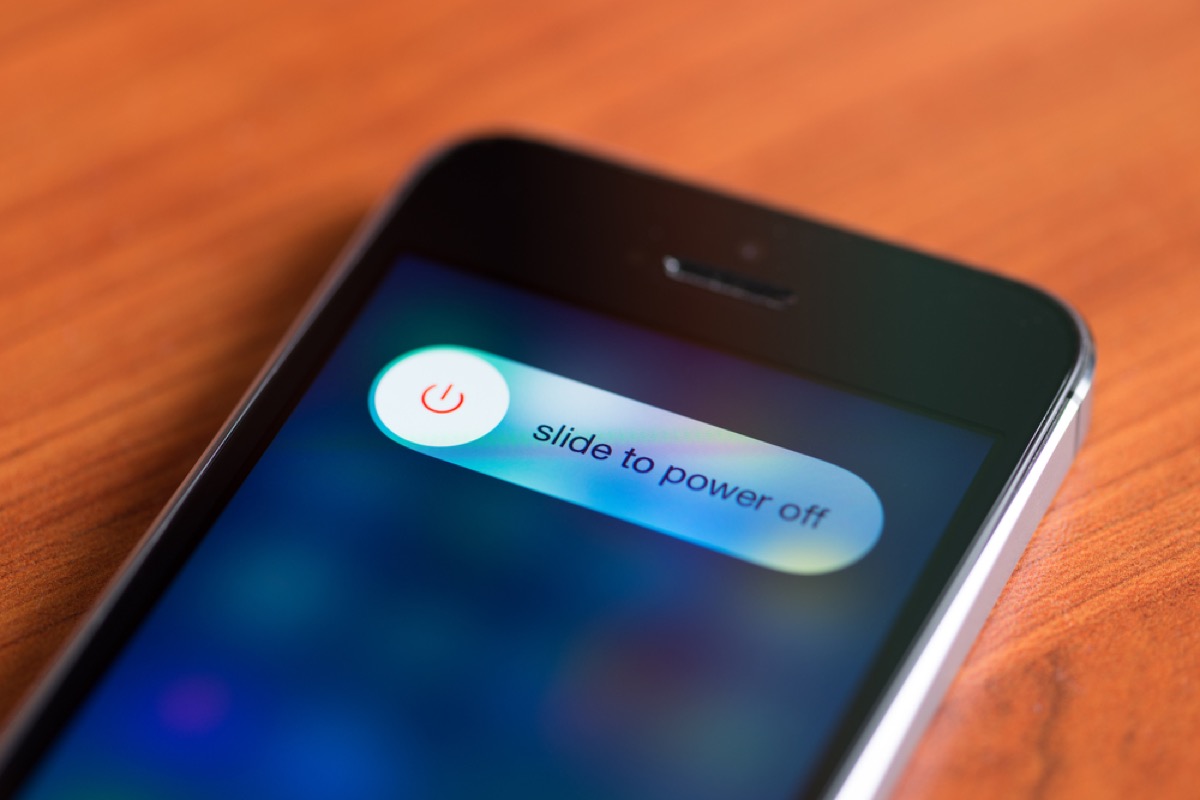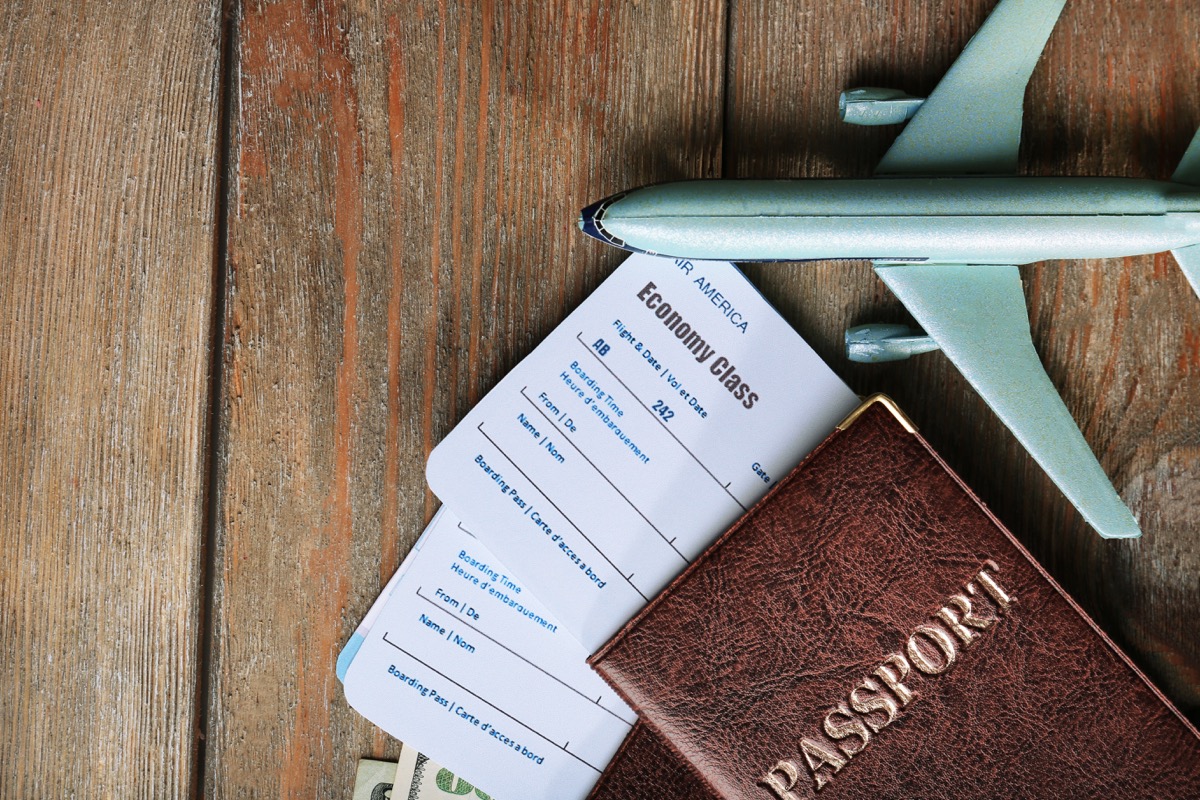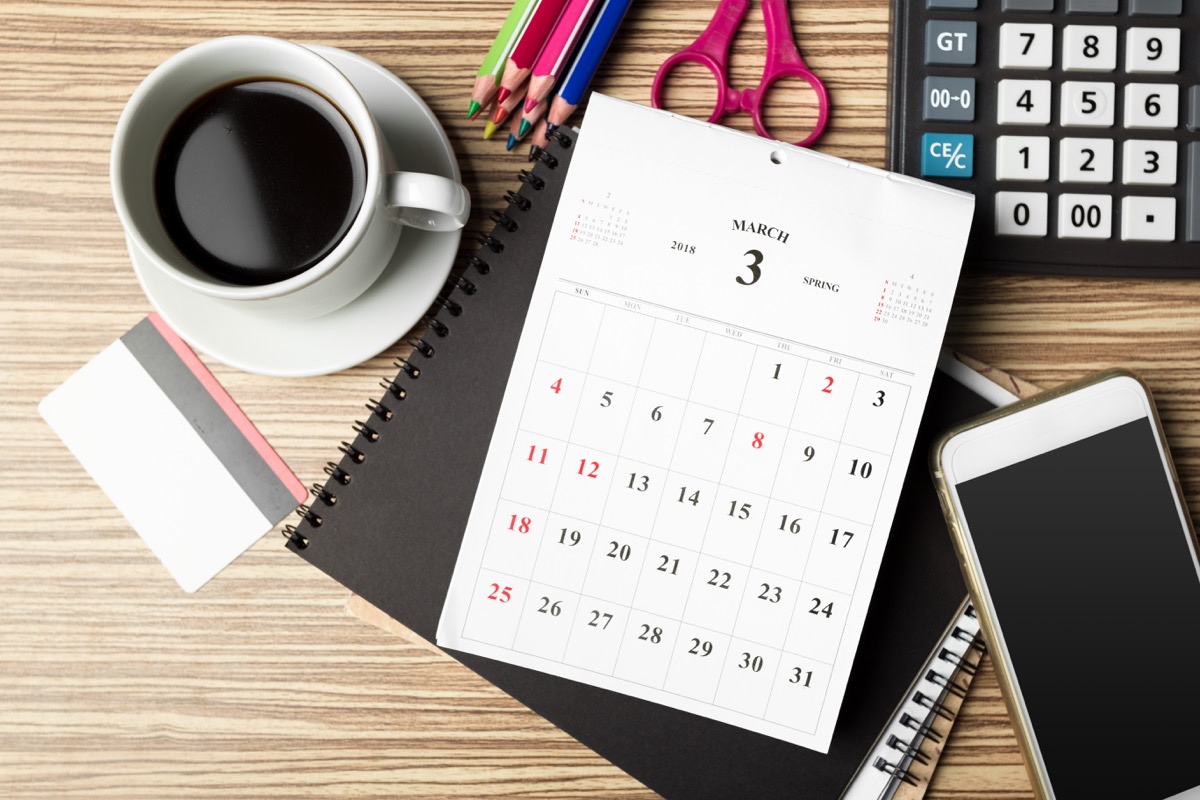40 Expert-Backed Ways to Have Better Work-Life Balance After 40
A little work-life balance can help you perform better at the office and be happier at home.

Those of us who started our careers well before the smartphone was invented have seen the workplace transform in the last decade. Companies have embraced remote working, technological innovations have made it easy to collaborate across the world, and more of us are setting out to "be our own boss" as an independent contractors and freelancers. But all of these developments have blurred the lines between our work lives and our personal lives. Where we used to leave work at the office, now we carry it in our pocket wherever we go, leading to an expectation that we should be on call at all times and making it more difficult to get out of "work mode" when we're vacationing or just out for dinner with friends.
But poor work-life balance can negatively effect both our personal relationships and our professional ones. So how do we restore the balance and get our lives back? We spoke to a number of experts who offered the following fantastic tips for achieving better work-life balance after 40.
1
Define what "life" means to you.

Part of the reason we let work bleed into our personal lives is that we have clear work goals, but are far less clear on what it is we want to do with our lives outside of work.
"If you don't set the goalposts for what you want from your time not working, then it's easy for a weekend to slip by and not feel like you had time out at all," says Marianne Cantwell, author of Be a Free Range Human: Escape the 9-5, Create a Life You Love and Still Pay the Bills. "So at the start of a vacation, or simply the start of next weekend, ask yourself: What are three things that would make this vacation/weekend a great one?"
That might be connection with family, time for a walk in nature, getting something done that's been on your list for a long time, or just a feeling you want to keep with you, Cantwell says. But the point is to make sure you're maximizing your free time and getting as much as you can from it, just as you would an afternoon spent working.
2
And define what "balance" means to you.

Before you can achieve work-life balance, you have to actually know what that means—not just "work" and "life" on their own, but the "balance" of the two collectively as well. Establish a clear picture of an ideal day: what it looks like when you're having a great day at work, what it looks like when you're enjoying your non-work life to its fullest, and then how the two balance one another.
"Balance is an extremely personal concept," says Rachel Cooke, founder of Lead Above Noise, an organization-development consultancy. "For some it might mean leaving at 5 p.m. or doing yoga, but for others it may mean being able to work wherever and whenever they want to, or building in a coffee date each day. The first key to balance is defining your own terms that are desirable and achievable."
3
Identify and prepare recharge moments.

Often, our work-life balance gets thrown out of whack because we forget we need downtime. We tend to just go through our day in a low-energy state that makes it hard to work effectively or enjoy ourselves once the workday is done. To help mitigate that, try taking designated breaks to recharge. "For some, it's a five-minute FaceTime call with their kids. For others, it's a quick cat video, and for some it may be reading an article or watching a TED talk," says Cooke. The important thing is to "know what you need and when you need it." And also to know that when it's done, you'll get back to work.
4
Use a pie chart to see the whole picture.

While we usually describe it as "work-life" balance, there are more than those two aspects to one's life. And to succeed in creating a true balance between your various commitments, getting a clear picture of all the moving parts is a must. Try actually drawing a pie and splitting into five categories: career, work, social, family, and home. "What is your vision of how you want to split your time? Allocate percentages for each that represent your present versus future state," suggests Marian Spinner, a former Fortune 500 leader who now spends her time career coaching clients on time management, career shifts, job search strategies, and more.
5
Start your day with non-work time.

If you're like many people, there's a good chance you immediately take a look at your work email when you wake up. Next thing you know, you're pulled into drafting a reply and suddenly your workday has begun before you've even put on pants. "It's better to start with a non-work activity, something that energizes you," says Reuben Yonatan, founder and CEO of GetVoIP. "I start every day by sitting down to breakfast with my family. We have four kids, so between their activities and my work, it can get really hectic once the day gets going. By starting with a meal together, I know we get some quality time together every day, then I can get to work and get things done."
Family breakfast doesn't necessarily have to be your morning ritual; it could instead be reading a few pages of a novel, getting in a brief morning workout, or meditating. The point is to take time to fully engage with the day—and save the work for when the workday actually starts.
6
Turn off your phone during set times.

No, we don't mean "don't check your phone." We mean turn it off completely, so you don't feel the buzz when a text or email comes through. Cantwell suggests setting times for your digital detox. Fully turning off your phone for a set period of time—whether for a whole weekend or just for a meal with someone you care about—makes a bigger difference, mentally, than just telling yourself you're not going to check it.
"The only way to do it is to schedule it as firmly as you would a doctor's appointment," Cantwell says. She adds that it's tempting to always be on, but that in the long run, this takes a toll on our bigger-picture thinking and creativity. "It's easy to think, 'I'm just replying to one message,' but when you are 'on the job' 24/7, your nervous system never gets a chance to shut down," she says.
7
Learn to say "no."

"It's so easy to say 'yes' to every opportunity that comes along, but I've learned the hard way that no one has time to say 'yes' to everything," says Yonatan. "Steve Jobs has that quote that 'Innovation is saying "no" to 1,000 things.' I think there's a lot of truth to that, and it's not just true for business. It's also true for life in general."
That can mean passing on a project that is sure to consume weeks of your life, or declining an invitation to grab drinks with a friend in order to spend quality time with your family.
8
Focus on the tasks that have the biggest impact.

It can be very satisfying to check items off your to-do list, or clear out your email inbox, or take care of that phone call you've been putting off for weeks. But in the midst of the dozens of day-to-day tasks that demand our attention, we tend to get caught up in trying to get things done, just for the sake of getting them done. With that mindset, you're bound to realize there is always one more thing to do, and one more after that, and one more thing after that.
"You can actually increase your efficiency by working less, which frees up more time for other important areas of your life," suggests Emma Donovan, MA, LPC, a therapist and coach based in St. Louis. "Focus on the tasks that bring about the biggest results, and not the ones that make you feel productive just because you are 'doing something.'"
9
Think about managing your energy, not your time.

We often think of "time management" as an ability to get as much done as possible in a set amount of minutes or hours. But as anyone who's tried to do some deep thinking after a big lunch can attest, not all hours are equally conducive to getting things done. "I have a few times every day where I know I tend to be really productive. I protect those times as much as I can, and I get a lot done that way," says Yonatan. "If I wait until late afternoon to do the most important projects of my day, it takes a lot longer to get through them. That's when I end up working late when I really didn't have to if I had just planned my day a little better."
Knowing what times of day are best for which tasks can make the difference between staying at work until the sun's down to get a presentation finished or wrapping up your to-do list by noon.
10
Delegate tasks at the office…

People who care a lot about the quality of their work tend to think, "If I want something done right, I have to do it myself." But this approach can sometimes lead t0 the exact opposite outcome of what you intended—having too many things to do means some of them probably aren't going to get done, right or wrong. Instead, Sara Abate Rez, founder of My Personal Brand, suggests drawing a line between work that is your responsibility and work that should be delegated to others.
"Step back from some of the projects that are really demanding a lot of your time and set boundaries around the type of work you are willing to do," she says. "Determine which projects you can delegate in order to avoid going back into that overwhelmed state. Realize that not all will fall apart without your involvement. Shifting some of the responsibilities will allow you to gain more space in your life, which will ultimately give you clarity to step back and function more effectively."
11
And delegate personal tasks at home.

Just as delegating menial or uninspiring aspects of your job can be an effective way to get better control of how you spend your time at the office, a similar approach to your tasks outside of work can help you focus on the more important things. If all your hard work nets you some extra cash, consider paying for services that can help free up your time at home. "Services like auto-detailing, pop-up gift shops, grocery delivery, dry cleaning, mobile barbering/glam squads can all be booked through apps, freeing up valuable time in your week," says Tina Urquhart, founder and CEO of Charm City Concierge. "This enables you to spend more time with family, pets, friends, or working towards goals outside of work."
Hiring someone to clean your house occasionally might be worth the money it costs if it means getting your Saturday to spend time with your kids. Figure out what chores in your daily life could be outsourced and remove those from your list.
12
Stop doing "fake work."

One of the most insidious ways we create fuzziness in the line between our work and our personal life is by dipping into "fake work"—you're at your work computer, but you're really just browsing the internet, checking social media, or doing other non-work activities.
According to Cantwell, this is especially dangerous for those who are self-employed. "You only get paid for what you do. So if you're in the 'always busy but never have time to take time off' cycle, make it a point to identify 'fake work' moments," she says. "Then close the laptop and step away, taking an hour, or a day off. You'll come back refreshed and dive right in the next day with far better results—and you'll be happier for it too!"
13
Use your vacation time.

Are you one of those people who pats themselves on the back at the end of the year for not using all their vacation time or personal days? You might want to rethink that. "In some companies, forgoing vacation time can be seen as a badge of honor because we assume more time at the office means more loyalty and productivity," says Donovan. "But actually, taking a vacation gives you the crucial time away you need to heighten morale, reduce stress, and approach work with vigor." If you've still got vacation days, use them!
14
Declutter your schedule.

Marie Kondo, the guru of decluttering and inventor of the KonMari Method, famously urges those seeking to simplify their lives to pick up items in their home and ask, "Does this spark joy?" When the answer is "yes," it stays; when the answer is "no," it gets tossed. The same strategy works with a daily and weekly schedule. "Take some time to imagine an ideal balanced life, then go through your daily activities and ask yourself which of them spark joy and are truly necessary," says Donovan. "You may be surprised at how many tasks you spend time on that are cluttering your schedule."
15
Don't use social media at work.

It may seem like it only takes a second of your time during the day to pop open Facebook and see what people are posting, but in reality, it can totally redirect your focus and make it hard to fully give your attention to the task at hand. That often means to get your work done, you will be staying at the office longer.
"When you work from home and are on social media for business purposes, it can be hard to focus," says Heather Castillo, founder of the blog The Super Mom Life. "I make sure that I limit any personal social media interaction during work hours, which leaves me more time to get my work done and in turn, gives me more time with my family once my work hours are over. If I want to get back on social media for personal reasons, I do that once the kids have gone to bed."
16
Make a to-do list—and stick to it.

To stay focused on what needs to get done on a given day at work, the key is to jot down a few items that you will push to complete that day. This clarity—and the feeling of completion it gives you once those items are finished—better allows you to close up shop for the day and go fully enjoy yourself outside the office.
"Purchasing a planner and listing my daily tasks has been a game changer for me," says Castillo. "I know exactly what I have to do each day and if I finish early, I will either start working on something for the following day or take the remainder of the day off to spend with my family. The list keeps me accountable for my deadlines and helps me to get some extra time off when I need it."
17
Put a hard stop on your workday.

Drawing a clear line between your workday and personal time is essential if you are going to fully succeed at either. And that means respecting the clock—when it says the workday is over, then that means it's over. "If you intend to stop working at 5 p.m. on Thursday, finish no later than 5 p.m.," urges Brian Richie, a senior advisor with Labtuit.com, a career advising and coaching organization in Silicon Valley. "Keeping to strict deadlines for yourself helps prevent burnout and work carrying over too much into your personal life. Set an evening or two aside every week that you dedicate to yourself. Allow yourself to relax, decompress, and do what you enjoy most to remain energized."
Giving yourself that hard stop also motivates you to complete tasks more quickly and with greater urgency than you might if in the back of your mind you told yourself, "I can always stay another hour to get this finished."
18
Schedule plans with others.

You have a far greater chance of sticking to a goal if you tell another person about it. The same is true of your efforts to strike, and keep, a balance between work and life. "For example, set a goal for a special date night with your significant other that you both get to enjoy once you hit a certain milestone," says Richie. "Now your significant other will be excited for you to work efficiently and effectively to accomplish your goal so they get a piece of the reward as well."
This approach can apply to many other aspects of encouraging a work-life balance, like asking a friend to meet you for drinks after work to ensure you leave the office when you say you will.
19
Say your goals out loud to yourself.

Just as telling another person your goals is often an effective way to help you stick with them, so is saying them aloud to yourself. That can mean simply stating, "I'm going to begin working at 9 and I will be done at 5," or something more big-picture.
With two decades of executive-leadership-building experience, Annicken R. Day, former chief cultural officer for IT company Tanberg, advises: "Say out loud to yourself (yes, I'm not kidding): 'I am the master of my own life. What I don't like, I can change. What I love, I will do more of. I am better to everyone else when I am charged, and I, and I alone, know what that will take. Therefore, I'm hereby deciding that whatever sucks my energy, I will do less of—and eventually eliminate from my life. What gives me energy, and makes me happy, I will do more of, and make it an important, integral part of the way I live my life.'"
20
Create white space.

Day also advocates putting "white space" on your calendar, which designates a time when you are free to do anything you'd like—as long as it's not work. "Talk with your family and friends, tell them why this is important to all of you," she says. "If you need a good analogy; use the security instruction from airplanes [that says] you need to put the oxygen mask on yourself before you help others. Remind them that you won't be much good to them, if you yourself cannot breathe."
21
Meditate.

There are few practices proven to be more effective at improving one's concentration and relaxation than meditation. "It helps you connect with your inner potential, helps you be more efficient at work, and cleanses the mind of worry and stress," says Vish Chatterji, executive coach and co-author of The Business Casual Yogi. "It also trains you to be more present and mindfully aware in human interactions. This makes you more efficient at reading people at work, and being truly there for your peeps at home."
22
Decompress between leaving work and going home.

An effective way to acknowledge when you are shifting from who you are at work to the person you are at home is to make a decompression ritual part of your day. "Have some practice to decompress between the end of the workday and seeing your family," says Chatterji. "That bookend to the day can be a short walk, a work-out, a meditation, or just cranking up the volume for a few minutes on the car ride home. Don't carry the workday into the living room."
23
Be kinder to yourself.

"Loving yourself is at the heart of work-life balance," says Charlene Walters, a business and branding mentor and author of Own Your Other. "Balance helps individuals in their personal lives by giving them time for the people and things that are special to them without feeling too stretched or guilty for not having enough time for everything." A sense of confidence in yourself and your own preferences can make every other decision you make about how your time is spent easier.
24
And be honest with yourself and others.

A greater honesty with ourselves and transparency with others—bosses, colleagues, family, and friends—about how much bandwidth we have is more likely to earn their respect and understanding than make them irritated that we can't do everything they ask of us. "Let everyone know where they stand and what your boundaries are," says Walters. "Get them on board with your boundaries and plans and tell them how you intend to find time for them, where they fit in and how important their buy-in is to you. You'll be surprised at how supportive they'll be."
25
Limit how much you talk about work at home.

You probably share everything about your life with your partner, and that includes your work. But while you should include your significant other on this important part of your life, it can be easy to let it continue to be your focus even when you're far from the office. The solution? "If you and your partner enjoy discussing work issues as a way to connect and unload, make a set time where you can download," says clinical psychologist Carla Marie Manly, PhD. "When we consciously 'discharge' work in this way, we set ourselves free from ruminating about work throughout our evenings and weekends."
26
Set micro tasks.

That foggy sense of always having more to do—even when it's the weekend, you're on vacation, or it's long past the end of the workday—can be mitigated by viewing big projects as a series of small tasks to be completed. Instead of letting the day drag into the evening because there is still so much left to be done on a given project, try wrapping up a handful of items on your list. That way, you can feel accomplished enough to call it a day and leave the other micro tasks for tomorrow.
27
And set micro goals, too.

In much the same way major projects can be broken into micro tasks, major changes you'd like to put into place in your life—such as better balancing your work and personal life—can be better accomplished by taking small steps toward the larger goal.
"Big changes can seem overwhelming," says Manly. "To avoid feeling defeated, it's important to create small micro goals to support the changes you envision. As you imagine your ideal new schedule, set out simple and achievable micro goals that will help you work toward the desired changes. You are far more likely to make needed changes when your goals are detailed, specific, and time-oriented."
28
Remember the impact you have on others.

If you don't get serious about drawing a line between your work and personal life for your own sake, consider the impact it has on your relationships and your family. Letting work take over everything is not just making you miss out on the important things in life, it's causing collateral damage to those who are most important to you. "If you have children—no matter their age—remember they learn 'how to be' by watching you," says Manly. "If you are focused on work even when at home, your children will feel that work should be the priority in life. Ask yourself, 'Am I being the type of worker, partner, and father I want my children to model?' Knowing that your actions influence others—from relatives to friends—can be a strong inspiration for change."
29
Find a passion project.

If work is taking over your life, it might be time to add something new into the mix that excites you more than getting work done. Finding a hobby or passion project that takes your mind away from the office can be the key to getting control of your personal life. "Write that screenplay, finger paint, start a charity, volunteer," suggests life coach and author Robin H-C. "Do something that is indulgent to your specific needs, giving yourself permission to love what you love and make time for that which reignites your internal fire."
30
Set—and respect—boundaries for yourself.

"Set very clear boundaries between work and your private life, and don't let one interfere with another, at least not on a regular basis," suggests Roger Maftean, a career expert and content strategist at ResumeLab. "Treat your home as a sanctuary and your free time as a holy time to get refreshed and gather energy for the next workday. Believe me, your family will appreciate it too."
31
Don't get caught up in the pursuit of perfection.

Fiddling with the wording of a report or some detail on a PowerPoint slide can lead you to waste hours of your time instead of staying tuned in to the things that actually matter. "As much as achieving 100 percent can bring great satisfaction, sometimes it is worth giving up a little," says Maftean. "In most cases, what you do needs to be done right, not perfect. This is by no means an invitation to be slacking off, but working beyond your own strength will have the opposite effect in the long run. Slow down and try to keep a healthy distance."
32
Make time for gratitude.

Numerous studies have found that our happiness and well-being can be enhanced by regularly reflecting on what we are grateful for in our lives. It's also a habit that makes us more effective at maintaining a balance in our work lives and our personal lives, focusing on what we appreciate about each. "When things get busy, and work-life balance is stressed, it's easy to feel stuck and drained," says Michael O'Brien, chief shift officer at Peloton Coaching and Consulting. "Having a gratitude practice before bed helps you shift your perspective toward what is working. It's a practice that can even help you see the value in your challenge because our challenges often spark future growth and success."
33
Don't sleep with your phone.

There are few clearer physical manifestations of a failing work-life balance than having a phone by your bed—subconsciously reminding you to think about work even when you're sleeping. Keep it out of reach, or (even better) out of the bedroom entirely.
34
Set realistic deadlines.

One of the biggest enablers of an out-of-whack work-life balance is when we are dishonest with ourselves about how much can get done in a given day or given timeframe. We agree to get some huge project done by Thursday and by Wednesday, we realize we're going to have to work until midnight to complete it on time. Mitigate this by setting realistic timelines on projects, whether they are long-term or just quick tasks. Your boss will respect you for being realistic.
35
Time yourself.

Setting realistic deadlines requires having a clear understanding of how much work you can actually get done in a given amount of time. To do this, start timing yourself and get a firm understanding of how much you can complete when fully focused on the task at hand. "Time-tracking will help you figure out how long it takes you to accomplish certain tasks," says Ellen Mullarkey, vice president of business development for the Messina Staffing Group. "Once you know this information, you can use it to plan your schedule more effectively and avoid overbooking yourself."
36
Take your personal time as seriously as a work meeting.

You probably set a time for a meeting with your boss and you probably show up to that on time, looking your best and ideally feeling mentally sharp. But you should do this with those who are most important to you in life, too. Give the conversation you have with your spouse the same attention you would a project meeting, and be present for a fun night out the way you would be giving a presentation.
37
Exercise.

There are few better ways to fully pull your brain out of "work mode" than sweating at the gym. "[Exercise] releases endorphins and lowers cortisol levels, which contribute to anxiety, and helps you sleep better," says David Strah, a licensed psychotherapist and author based in Los Angeles. "Exercise is a great way to improve work-life balance and can be a great way to transition or decompress from work to home."
38
Eat better.

We are what we eat, and a balanced, healthy diet is crucial to a balanced, healthy life. When you're in the midst of an intense work project and staying late at the office, it's easy to order takeout or fast food, convincing ourselves that we are too busy to be able to worry about eating more responsibly. But eating healthier food benefits you in all aspects of your life. "It gives you more energy to work on your business, but then you can go home and engage with your life without crashing into exhaustion," says Kayla Pendleton, owner and founder of Make Her Mark, a co-working space and community for entrepreneurial women.
39
Ask for help.

"Being out of balance happens so often because we think we have to do everything on our own," says Pendleton. "But you have no idea how much easier it could be if you just are willing to ask for help. Not just help with doing the things you need to do, but also help in learning how successful people manage their time in business and in life." By reaching out to others to help shoulder the burden or offer guidance, you will be able to free yourself up to truly live and enjoy your life.
40
And accept that sometimes you will be off balance.

As with everything else in life, there will be exceptions to the rules we set for ourselves in our aim to achieve work-life balance, and occasionally a major project or particular demand might make it necessary to buckle down and work late into the night or over the weekend. But that should be the exception, not the rule. "I love the work I do … so I don't mind that sometimes, I have a bunch of long days," says Pendleton. "But then, I make sure to take down time that's just about me and my family."





















